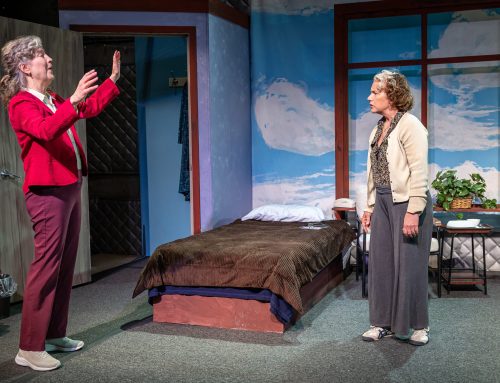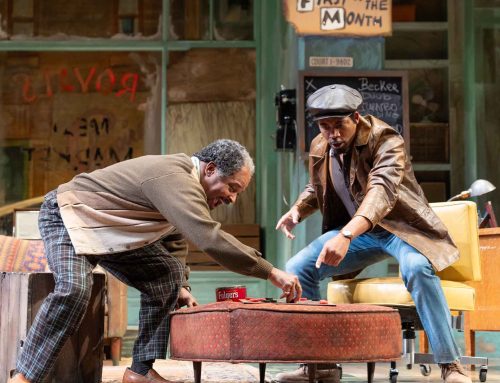February 24, 2007 – Opening Performance
Ashland, OR
at the Oregon Shakespeare Festival

Symbolism alert! Or, as redozdachs said as I prepared to come up for opening weekend, “This is your first chance to say ‘good-bye’ to Libby Appel for the last time.”
Yes, Oregon Shakespeare Festival’s Artistic Director Libby Appel is retiring this season. Her very talented but very self-satisfied, self-congratulating Presence will soon no longer permeate through all sectors of the Ashland stage. She choose to direct this Chekhov classic about change, loss, and growth as a parting gift. What a schmaltzy, in-your-face symbolic choice. As much as it pains me to say it, “Thank you, Libby.”
There is cigarette matchbook cover showing a cartoon dinosaur ambling across some prehistoric landscape with the inscription “Adapt or Die!” The obvious target of the message is the avid nicotine addict who is about to deliberately pick up speed down his own road to extinction. The Cherry Orchid, pitched to us upper-middle class culturaholics, has an analogous, if not exactly similar, feel. Just who is sitting in the seats, watching the throes of the old comfortable aristocracy not dealing with inevitable change?
No matter. Enough irony.
Chekhov’s complex yet obvious characters are created extremely well by the company. The old ruling class’s loss of station and place aches. The adaptable, new moneyed class’s unmalicious frustration at the unchangeable essence of their former betters is genuine. Young people experimenting with their roles in life and hangers on of all motivations and stripes walk though the play, helping to weave the tragedy.
This production uses every strength Chekhov created and adds its own artistry.
Judith Marie Bergen (Lyubov, the sister) is classy and understated. There’s richness in her effete compulsions and beauty in her moral weakness.

Gwendolyn Mulamba (Varya, the adopted daughter) reprises the intense, self-denying, Puritanical character she used last year in Intimate Apparel. The self-righteous intenseness works again, and I am left hoping that she’s cast soon in a part where she gets her man. I need her to be rewarded for her purity.
Speaking of legitimate self-righteousness, Mulamba’s co-star in Intimate Apparel, Gregory Linington (Pyotr, student), makes the arch typical “I have all the answers, I am pure” character work. He underplays moments of potential polemic-induced scenery chewing while smartly foreshadowing the revolution which Chekhov himself didn’t live to see.
Nancy Rodriguez (Dunyasha, maid) lets her smallish character show us a perspective from a different class and age. But, it’s hard to single her out without also praising Anthony Heald (Boris, a neighbor), Christine Albright (Anya, daughter), and the other members of the cast. Excellent performances abound on stage and are enhanced by the superior behind-the-scenes craft work.
Costumes should be natural, unobtrusive, and help move the show along the path charted by the director. Costume Designer Deborah Dryden does such a good job at matching character, mood, and time that the clothes became noticeable in their flawlessness. Bergen’s gowns were just the right quality and tone in scene after scene, ever changing but always elegant. Meanwhile Linington’s ascetic student properly wears the same drab hair shirt uniform no matter the circumstance. Visually crisp and without artifact, Dryden practices costuming as an art.
There’s more symbolism to mine, explore, and roll around in your mind. PhD theses probably have been written on the meaning of the impressionistic sound Chekhov introduces midway through the play and reprises and the end. Reportedly written to be like a string breaking, sound designer Todd Barton gives us an impressive but in-context aural hook for our interpretation. Barton also creates great sounds of tress being chopping, described by Albright in an off-stage interview as reminding her of clomping feet of the giants referred to earlier in the script.
Chekhov’s story has layers and interwoven reflections that could easily distract and swap an audience. Libby’s clarity and obvious love of the theme is a true gift to the audience. She delivers a Cherry Orchid that prepares us for change and new growth.
New Ashland playgoers can see this production with criticism only for the bad hair piece and make up used by Richard Elmore (Firs, head butler).
OSF regulars can also hope that this year marks the end of the type casting of some of the company members. God-awfully stuck in the same role redundantly over and over again is Christopher DuVall (Semyon, clerk). DuVall always is farcical and physically bouncy. He doesn’t bounce on any furniture in Cherry Orchid, but does jump up and down in place some. Will someone please turn off his batteries? Meanwhile, even the infinitely better performances of Mulamba and Linington are somewhat cut and pasted from last season. These two may be perfect, but the purist in me would like an opportunity to see their range.
![]()





Leave A Comment